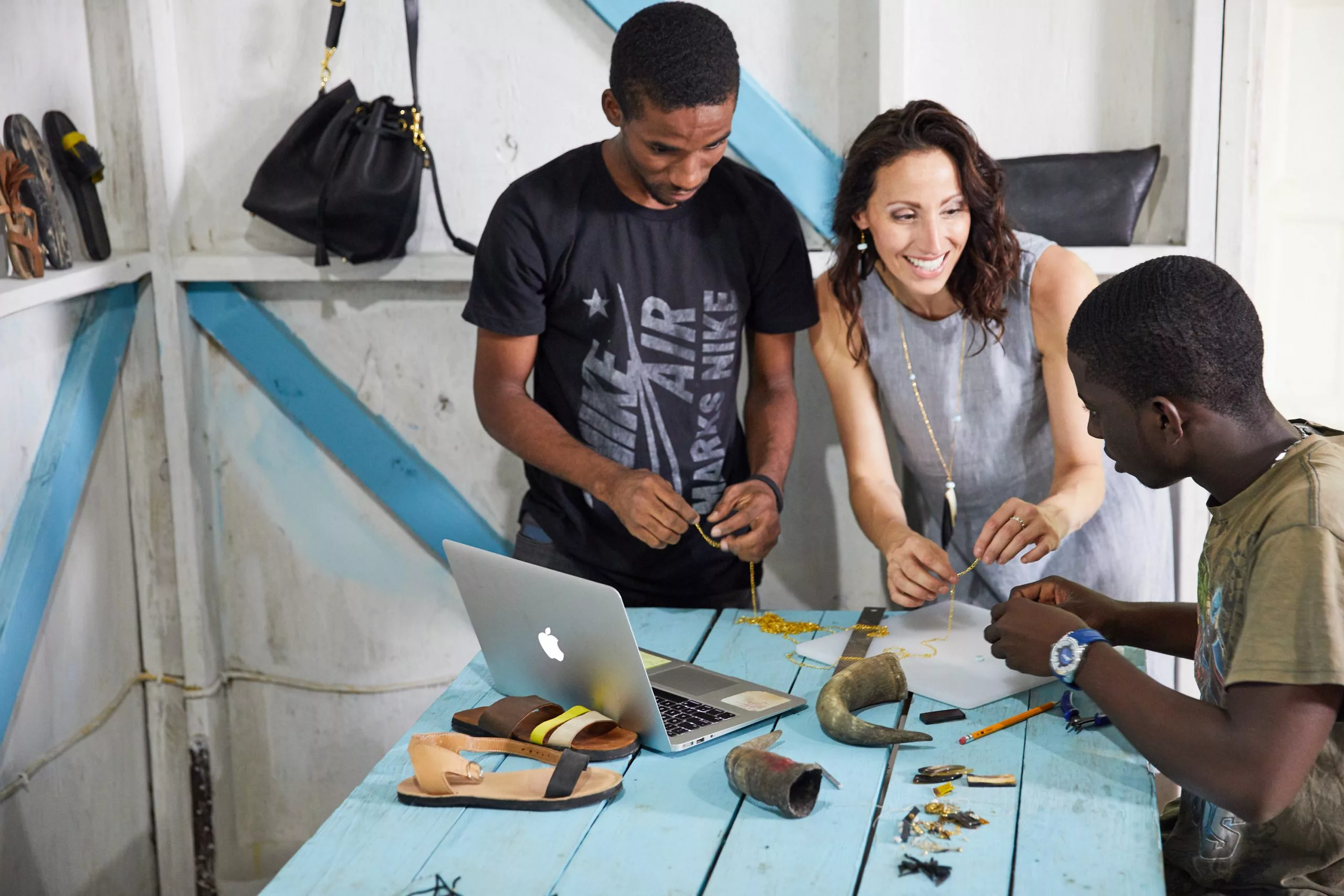When Julie Colombino founded deux mains (French for ‘two hands’) in the wake of the 2010 Haitian earthquake, she and her local collaborators were driven by a simple, yet effective, vision: build a company on what each of them could create with their own two hands. The goal was to empower local citizens through dignified employment that would directly impact and alleviate poverty, so that they could reunite their families, procure food and medical care, and send their children to school. Deux mains is an employee-owned and -operated ethical fashion brand that provides sustainable income for local makers. After the success of their unique sandal line, made from upcycled discarded tires, deux mains has continued to expand its offerings into purses and other sustainable fashion items made from locally sourced materials. We sat down with Colombino — one of the 2017 recipients of theEILEEN FISHER Woman-Owned Business Grant Program — to find out more about how she built deux mains and came to understand that the simple decision to buy ethical fashion transforms lives and makes a measurable impact in the fight to alleviate global poverty.
How did you get started in this line of work?
Julie Colombino: For you to fully appreciate the deux mains brand, I have to start my story at the beginning: January 12, 2010. While I was volunteering as a relief worker in Haiti after the 2010 earthquake on that date, I founded a nonprofit organization, REBUILD Globally, which still exists today. However, the women who survived this horrible disaster were looking for more: they wanted to find ways to help them recover their livelihoods. Not only were their homes destroyed, but their places of work were destroyed, too. I wanted to find a sustainable solution. I opened a small center and trained women to make sandals from the tires we found in the streets. Over the years, through the efforts of REBUILD Globally, we were able to incubate a Haitian-owned and -operated for-profit business in 2015, deux mains designs. Now we employ dozens of craftspeople who make a living wage and are able to support their extended families. Our sandals line has transitioned into a full accessories and handbag line for which we source 97 percent of all raw materials from the island.
Can you describe your approach to impact?
JC: Our motto is “Poverty is complex, making a difference isn’t.” I believe all people are powerful. We are each given different talents and strengths, and if we use those gifts in a community-centric way, we experience and witness great change. It doesn’t have to be complicated. There’s power in making the choice to buy from an ethical brand. Every day, when someone buys a pair of sandals or a handbag from us, they’ve taken an effective step towards eradicating poverty. I think that’s one of the most inspiring things about our time: We have the power to do good by the simple choices we make.
It’s also important to remember that good business and good business practices empower everyone. I attribute our success in no small part to building a culture of growth and mutual respect. Our values ensure we stay true to local craftsmanship, local leadership, living wages, and our commitment to lessening our environmental footprint. Through our partnership with REBUILD Globally, we cultivate a trained workforce. I used to think the best way to make an impact was to help people recover during the onset of disaster, when volunteers literally hand out things that are needed to survive the night. Through our business, I’ve come to understand the value of a long-term strategy and approach. I’ve seen families transform. It has been such a gift to learn that you can do sustainable good and have a long-term impact on families by running a profitable business.
Rebuilding in the wake of the 2010 earthquake in Haiti was anything but simple. Can you share how you’ve been challenged personally, and as a leader — and how you grew through the process?
JC: Challenges. Yup, I’ve had a lot of those. In March of 2012, my car blew up. Seriously. It burst into flames. A week later our workshop was robbed: generator, inverters, and tools — all gone. Four days after that, we had a flood, and all our inventory and materials were ruined. Then I got dengue fever, a horrible mosquito-born illness. By the end of that month, I was literally broke and I was so sick of being sick I didn’t think I could bear it anymore. I went into the training center and sat next to my business partner, Jolina, and started crying. After about a minute, she used her thumb to wipe off my tears and then she clapped her hands and said, “ok Julie ana lè – lets go. Back to work.” The spirit of Haiti, Jolina’s spirit, that’s what gave me the strength to carry on. Thanks to that catalytic moment, a small group of untrained women were able to turn our humble beginning into a sustainable fashion company that creates private label products for designers like Kenneth Cole. We’ve even opened an extremely successful second job training center in a refugee camp. It’s safe to say that the lessons I learned from the people of Haiti have empowered me to grow into the woman (and leader) I want to be.
How do you ensure that the local populations are respected and heard? How do you involve them in the process?
JC: After the earthquake, I felt a burden so deep to help the people of Haiti, that I quit my job, sold my house, and lived in a tent for almost a year so that I could not only assist survivors, but learn from them what it would take to rebuild in a sustainable way.
In the early days of my journey, the daily situations were so intense and unbearable, I didn’t think I would make it. I prayed for help. The peace I later found came when I learned to listen. I listened to the women of Haiti as they told me they wanted the ability to feed their own children, and pay for their school tuition. Their goal wasn’t to get out of the tents, they wanted to take back everything the earthquake and poverty stole from them. They wanted their dignity back. They wanted jobs — jobs with good hours, growth opportunities, training, benefits … all the things that every human wants. That’s the bedrock upon which we built our company. I co-own deux mains with my Haitian colleagues. We involved people in the process by truly co-creating and using the skills that each one of us brought to the table in a significant way.
What are your top three tips for other entrepreneurs seeking to collaborate with local populations? How might they avoid some common pitfalls?
1. Practice active listening.
I say “active,” because we’re typically in such a rush to move and hustle, we forget how to simply be. Being in community allows active listening to be integrated into collaborations. The hard thing about this is that it takes time — a lot of time. I always say we’re an intentionally slow-growth company. And it’s worth it.
2. Continue to learn and grow.
I’m grateful to have received the Martin Bell Scholarship from Rollins College, and in just a few weeks, I’ll graduate with my MBA. Having the ability to continue my formal education has been a gift. It’s also important to continue to learn informally. For example, I’ve learned Creole, and continuously educate myself about ethical fashion through blogs and partnerships. Apply lessons learned from others to your own ventures.
3. Cultivate professional maturity — that is, humility and humor.
Our work is hard. Learning to practice humility and humor has been a saving grace. I take the higher road, even when it doesn’t feel “fair” to me (which is more often than I’d like). We all remember the old saying: Life isn’t fair. I try to make jokes and let things roll off my back. That allows me to stay focused on my real calling and avoid distractions.
Any advice you wish you could give yourself back when you were starting out?
JC: Hire a professional designer! I never would have imagined myself in this position and deux mains has been my crash course into the world of fashion. Over the years, I’ve benefited from game-changing collaborations. About four years in, we partnered with designer and philanthropist Kenneth Cole on a collection called the Love Haiti Collection. He and his team have mentored us on design and production. I’ve also had a lot of help from our brand ambassador, fashion model Heide Lindgren. She has designed some of our most successful women’s collections based on her knowledge and expertise. If I’d had the capacity to think about professional partners earlier on in my journey, I believe I’d have had a lot less heartache.
How can we do our part to help alleviate poverty?
JC: Join the ethical fashion movement. Manufacturing is a billion-dollar industry. If each one of us chooses to buy things that are not made in sweatshops, and that don’t destroy our planet, we are directly supporting the alleviation of poverty in our communities and around the world.
This article is part of a series featuring the 2017 winners of the EILEEN FISHER Woman-Owned Business Grant Program. Instilling confidence in female business owners is one of Eileen Fisher‘s personal passions, and since 2004 the grant program has supported innovative, women-owned companies that are beyond the start-up phase and ready to expand their business and their potential for positive social and environmental impact.




